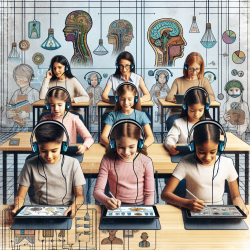Introduction
In the realm of speech-language pathology, the intersection of music and language offers a fascinating avenue for exploration. A recent study titled "Reading fluency and pitch discrimination abilities in children with learning disabilities" delves into this intersection, revealing insights that could transform educational strategies for children with learning disabilities. As practitioners committed to data-driven decisions, understanding the nuances of this research can empower us to create more effective interventions.
The Study at a Glance
The research conducted by H. Lu et al. investigates the relationship between pitch perception, pitch matching, and reading fluency in children with learning disabilities. The study involved two groups: children with learning disabilities and typically developing peers. Through a series of pitch discrimination and reading fluency tests, the researchers uncovered significant differences between the groups, highlighting the impact of pitch perception on reading skills.
Key Findings
- Children with learning disabilities demonstrated impaired pitch discrimination and matching abilities compared to their typically developing peers.
- There was a notable correlation between pitch perception abilities and reading fluency, with deficits in pitch perception linked to reduced reading performance.
- The study suggests that musical pitch perception may play a crucial role in the processing and production of speech, impacting reading skills.
Implications for Practice
For practitioners in speech-language pathology, these findings underscore the importance of incorporating auditory and musical training into interventions for children with learning disabilities. Here are some practical strategies:
- Integrate Music Therapy: Utilize music-based activities that focus on pitch discrimination and rhythm to enhance auditory processing skills.
- Auditory Training Programs: Implement targeted auditory exercises that improve pitch perception and matching abilities, potentially boosting reading fluency.
- Collaborative Approaches: Work with music educators to develop interdisciplinary programs that address both musical and linguistic competencies.
Encouraging Further Research
While this study provides valuable insights, it also highlights the need for further research to fully understand the mechanisms linking pitch perception and reading fluency. Future studies could explore:
- The impact of different types of musical training on reading skills across various learning disabilities.
- Longitudinal studies to assess the long-term benefits of integrating music and language interventions.
- Cross-cultural studies to determine if these findings hold true across different languages and educational systems.
Conclusion
As we strive to create positive outcomes for children with learning disabilities, leveraging the power of music and auditory processing could be a game-changer. By embracing the findings of this study and encouraging further research, we can pave the way for innovative interventions that enhance both language and musical skills.
To read the original research paper, please follow this link: Reading fluency and pitch discrimination abilities in children with learning disabilities.










